When
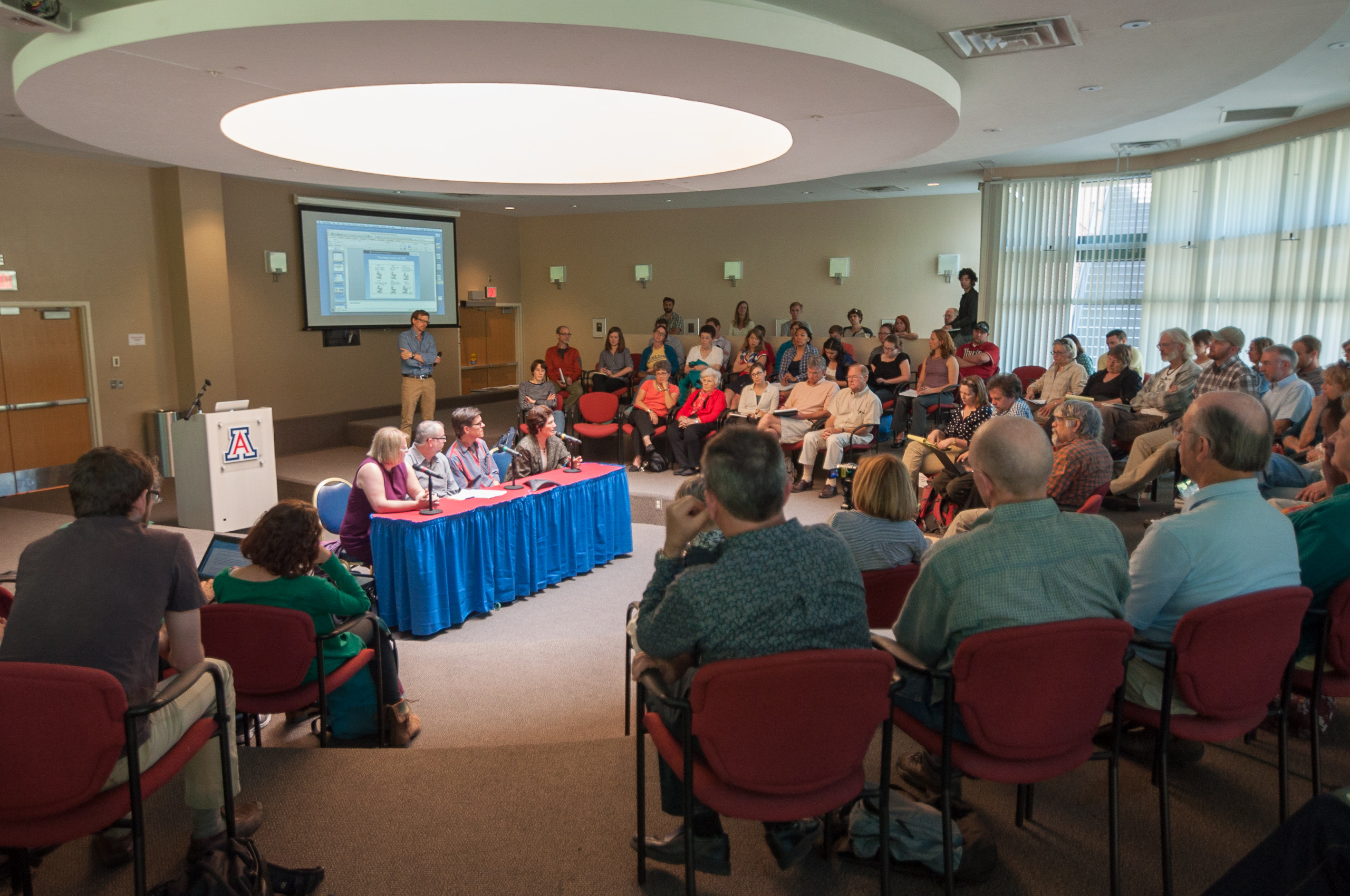 A video recording of this IPCC panel discussion is now available on the CLIMAS media page.
A video recording of this IPCC panel discussion is now available on the CLIMAS media page.
Monday, March 31, 2014
11:00 a.m. - 12:30 p.m.
UA Student Union, Kiva Room
CLIMAS and the Center for Climate Adaptation Science and Solutions are co-sponsoring a panel of UA experts to discuss the forthcoming report from the Intergovernmental Panel on Climate Change (IPCC) entitled "Impacts, Adaptation, and Vulnerability." This report, from the IPCC's Working Group II (WGII), provides an assessment of the scientific, technical, environmental, economic and social aspects of climate change vulnerability for and impact on ecological systems, socio-economic sectors and human health, with an emphasis on regional, sectoral and cross-sectoral issues.
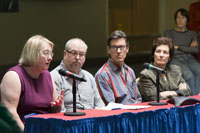 A panel of UA experts will discuss the report and field questions. We encourage interested members of the public, the university community, and the press to attend.
A panel of UA experts will discuss the report and field questions. We encourage interested members of the public, the university community, and the press to attend.
The WGII Report's Summary for Policymakers is scheduled to be released just prior to the event and will be available at: http://www.ipcc.ch
The panelists are as follows:
Jonathan Overpeck, co-director of the UA Institute of the Environment and a lead author on the IPCC WGII chapter on terrestrial and inland water systems, will provide a short overview of the Summary for Policymakers. Overpeck has published more than 160 papers in climate and the environmental sciences and served as a coordinating lead author for the Nobel Prize-winning UN Intergovernmental Panel on Climate Change (IPCC) Fourth Assessment (2007).
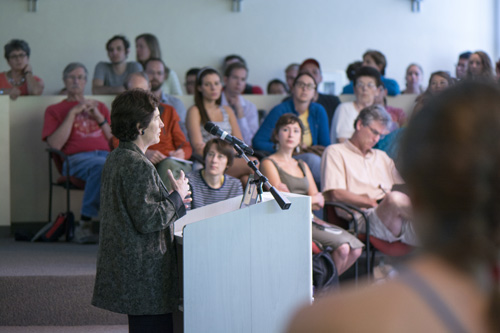 Kathy Jacobs, director of the UA Center for Climate Adaptation Science and Solutions, will speak on some of the climate adaptation activities detailed in the forthcoming IPCC report with a particular focus on North America. Jacobs is a nationally recognized water, climate and adaptation expert who recently returned to the UA from Washington, D.C., where she spent the past four years as assistant director in the Office of Science and Technology Policy in the White House. There she was the lead advisor on climate adaptation and water issues and director of the Third National Climate Assessment.
Kathy Jacobs, director of the UA Center for Climate Adaptation Science and Solutions, will speak on some of the climate adaptation activities detailed in the forthcoming IPCC report with a particular focus on North America. Jacobs is a nationally recognized water, climate and adaptation expert who recently returned to the UA from Washington, D.C., where she spent the past four years as assistant director in the Office of Science and Technology Policy in the White House. There she was the lead advisor on climate adaptation and water issues and director of the Third National Climate Assessment.
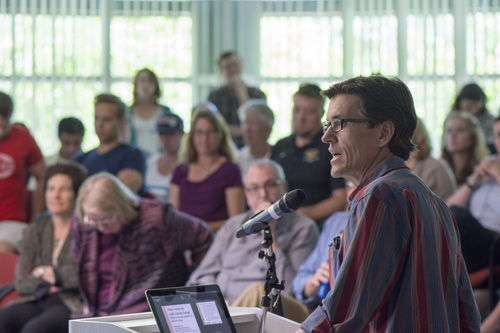 Christopher Scott, an associate professor in the UA Udall Center for Studies in Public Policy and the School of Geography and Development, will discuss adaptation and decision making in the context of water resource issues in the Southwest and across the globe. His research and stakeholder engagement work addresses water resources and policy, human-environment interactions, the water-energy nexus, and climate adaptation. His applied research emphasizes the importance of science-policy dialogues with particular attention to ecosystem services, groundwater depletion, water reuse, and transboundary adaptive management.
Christopher Scott, an associate professor in the UA Udall Center for Studies in Public Policy and the School of Geography and Development, will discuss adaptation and decision making in the context of water resource issues in the Southwest and across the globe. His research and stakeholder engagement work addresses water resources and policy, human-environment interactions, the water-energy nexus, and climate adaptation. His applied research emphasizes the importance of science-policy dialogues with particular attention to ecosystem services, groundwater depletion, water reuse, and transboundary adaptive management.
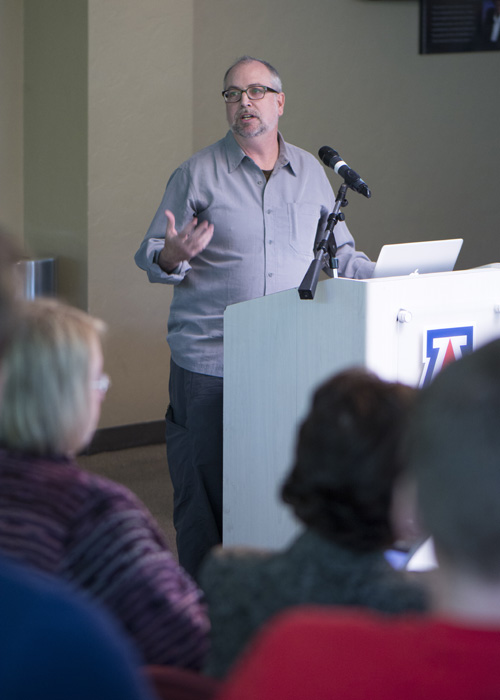 David Breshears, a professor in the UA School of Natural Resources and the Environment, will discuss climate change impacts on ecological systems. His research focuses on interactions among woody and herbaceous plants in the context of the grassland/forest continuum, ecological and hydrological interrelationships, impacts of drought and fire, water and wind erosion, and more recently, biophysical scaling relationships and new technology for measuring soil carbon. His research has been applied to a diverse set of assessments in areas including contaminant-related risks, land management, and global change.
David Breshears, a professor in the UA School of Natural Resources and the Environment, will discuss climate change impacts on ecological systems. His research focuses on interactions among woody and herbaceous plants in the context of the grassland/forest continuum, ecological and hydrological interrelationships, impacts of drought and fire, water and wind erosion, and more recently, biophysical scaling relationships and new technology for measuring soil carbon. His research has been applied to a diverse set of assessments in areas including contaminant-related risks, land management, and global change.
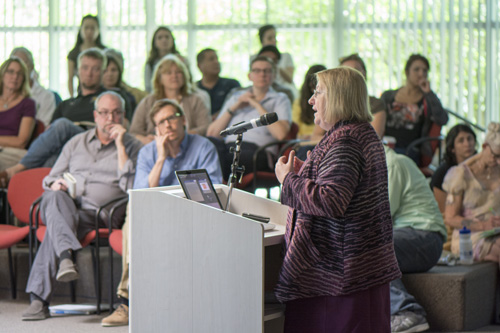 Diana Liverman, co-director of the UA Institute of the Environment, will discuss impacts on, and vulnerability of, food systems, human security, key economic sectors, and other cross-sectoral issues. Her research focuses on the human and social dimensions of environmental issues including vulnerability and adaptation to climate change, environmental change and food security, and international climate and environmental policy. She has authored or edited seven books, more than 100 journal articles and book chapters and has supervised more than 60 graduate students.
Diana Liverman, co-director of the UA Institute of the Environment, will discuss impacts on, and vulnerability of, food systems, human security, key economic sectors, and other cross-sectoral issues. Her research focuses on the human and social dimensions of environmental issues including vulnerability and adaptation to climate change, environmental change and food security, and international climate and environmental policy. She has authored or edited seven books, more than 100 journal articles and book chapters and has supervised more than 60 graduate students.

